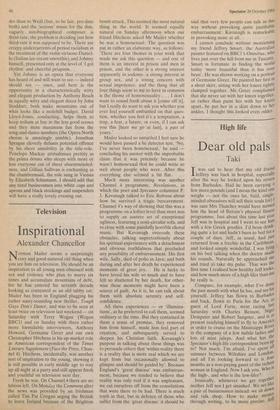Television
Inspirational
Alexander Chancellor
1Vorman Mailer seems a surprisingly 1. cosy and good-natured old thing when you see him on television. He should be an inspiration to all young men obsessed with sex and violence who plan to marry six times and accumulate mountains of debt, for he has entered his seventh decade looking as contented as an old tabby cat. Mailer has been in England plugging his rather nasty-sounding new thriller, Tough Guys Don't Dance, and was to be seen at least twice on television last weekend — on Saturday with Terry Wogan (Wogan BBCI) and on Sunday with three rather more formidable interviewers, Anthony Howard, Germaine Greer and our own Christopher Hitchens in his up-market role as American correspondent of the Times Literary Supplement (Face the Press, Chan- nel 4). Hitchens, incidentally, was another sort of inspiration to the young, showing it is still possible in early middle age to stay up all night at a party and still appear fresh and youthful on television next day.
Fresh he was. On Channel 4 there are no taboos left. On Monday the Comment after the news was provided by an Irishman called Tim Pat Coogan urging the British to leave Ireland because of the Brighton bomb attack. This seemed the most natural thing in the world. It seemed equally natural on Sunday afternoon when our friend Hitchens asked Mr Mailer whether he was a homosexual. The question was put in rather an elaborate way, as follows: 'There are four themes in your work that made me ask this question — and one of them is an interest in prison and men in prison, and the other is a strong interest apparently in sodomy, a strong interest in group sex, and a strong concern with sexual impotence; and the thing that all four things seem to me to have in common is the theme of homosexuality . . . I don't want to sound fresh about it [come off it], but I really do want to ask you whether you ever feel yourself embattled on that ques- tion, whether you feel it's a temptation, a trap, a fear, a future, or even, if I can ask you this [here we go at last], a past of yours.'
Mailer looked so unrattled I feel sure he would have passed a lie detector test. 'No, I've never been homosexual,' he said concluding his answer with the improbable claim that it was precisely because he wasn't homosexual that he could write so well about people who were. After this everything else seemed a bit flat.
Much more interesting was another Channel 4 programme, Revelations, in which the poet and Spectator columnist P. J. Kavanagh talked to Eric Robson about how he survived a tragic bereavement. Channel 4's way of showing that this was a programme on a loftier level than most was to supply an austere set of exceptional ugliness, featuring a semi-circular sofa, and to close with some painfully horrible choral music. But Kavanagh overrode these obstacles, talking unpretentiously about his spiritual experiences with a detachment and obvious truthfulness that precluded any possibility of embarrassment. His first wife, Sally, died of polio in Java; and both during and after her death he experienced
moments of great joy. He is lucky to have loved his wife so much and to have felt so shattered by her death, for other- wise these moments might have been a source of guilt. As it is, he can talk about them with absolute serenity and self- confidence.
All these experiences — or 'illumina- tions', as he preferred to call them, seemed ordinary at the time. But they contained in them a sense of promise, they removed him from himself, made him feel part of creation, and subsequently served to deepen his Christian faith. Kavanagh's purpose in talking about these things was to persuade others that 'within reality there is a reality that is more real which we are kept from but occasionally allowed to glimpse and should be guided by'. Because England's 'great disease' was embarrass- ment, because we tended to believe that reality was only real if it was unpleasant, we cut ourselves off from the consolations that were there to be had. There is much truth in that, but in defence of those who suffer from the 'great disease' it should be said that very few people can talk in this way without provoking quite justifiable embarrassment. Kavanagh is remarkable in provoking none at all.
I cannot conclude without mentioning my friend Jeffrey Smart, the Australian painter featured on BBCI's Omnibus, who lives just over the hill from me in Tuscany. Smart is fortunate in finding the world today 'more beautiful than it has ever been'. He was shown working on a portrait of Germaine Greer. He painted her first in a short skirt, sitting with her knees tightly clamped together. Ms Greer complained that she never sat with her knees together, so rather than paint her with her knees apart, he put her in a skirt down to her ankles. I thought this looked even odder.


















































 Previous page
Previous page